Find Help
More Items From Ergsy search
-
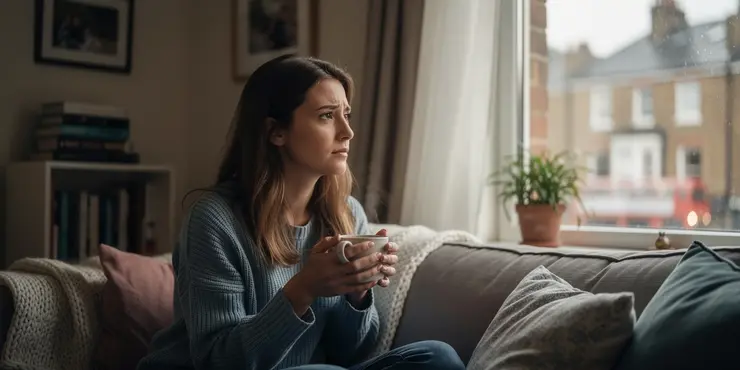
Suicidal Thoughts - Kirsty
Relevance: 100%
-

Linda | Surviving Suicidal Thoughts
Relevance: 94%
-

Kirsty | Surviving Suicidal Thoughts
Relevance: 94%
-
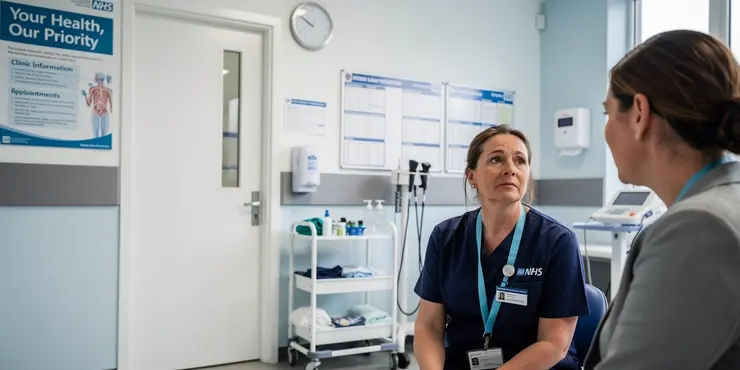
SLaM's Suicide Prevention, Learning and Support Strategy
Relevance: 51%
-

Suicide and Self Harm Prevention Strategy 2023-28
Relevance: 46%
-

Dr Hilary Jones shares his professional and personal thoughts on Colten Care
Relevance: 23%
-

What are the symptoms of postnatal depression?
Relevance: 22%
-
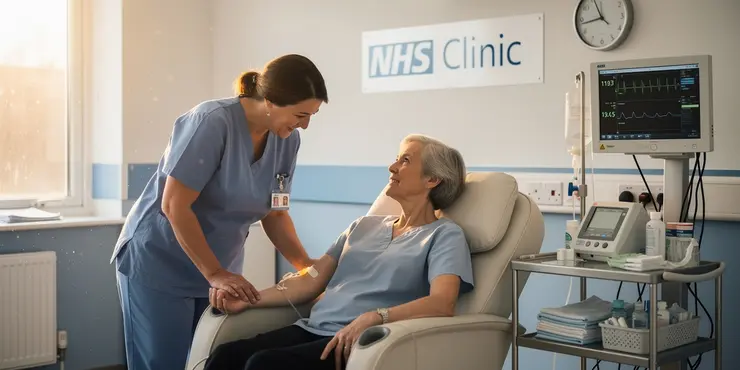
What conditions is ketamine used to treat?
Relevance: 17%
-

Small Talk Saves Lives
Relevance: 17%
-

What are the symptoms of SAD?
Relevance: 17%
-
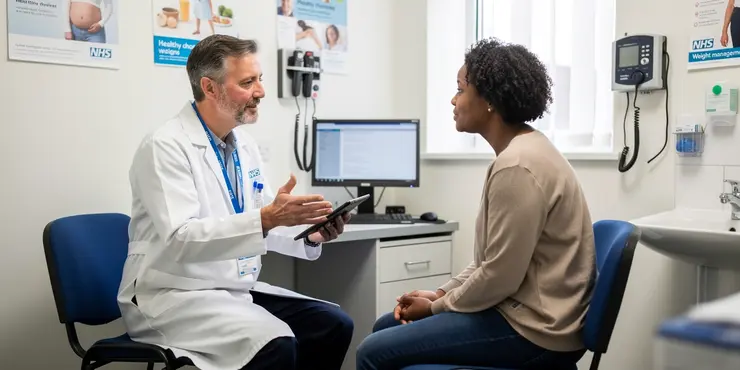
What are the less common but serious side effects of weight loss drugs?
Relevance: 16%
-
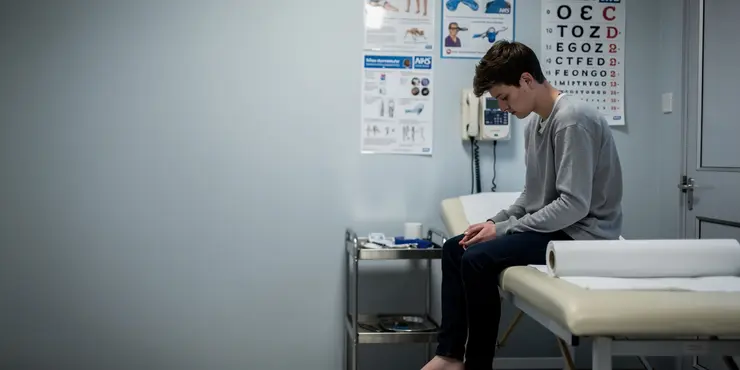
Self Harm
Relevance: 15%
-
What is body dysmorphia and how is it related to eating disorders?
Relevance: 15%
-
What are the long-term effects of untreated eating disorders?
Relevance: 14%
-
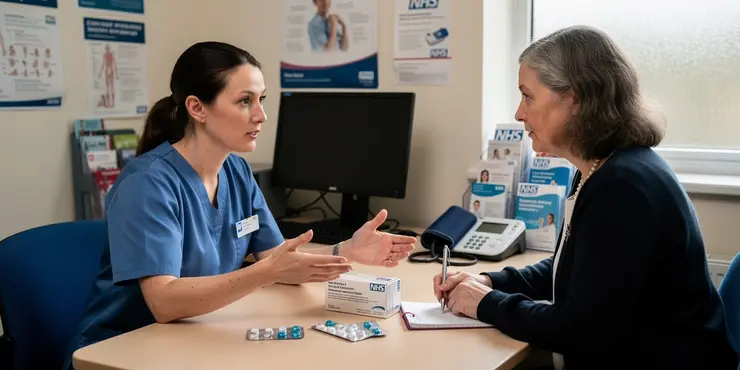
Are there any contraindications for using Wegovy?
Relevance: 13%
-

How does the loneliness epidemic impact mental health?
Relevance: 13%
-
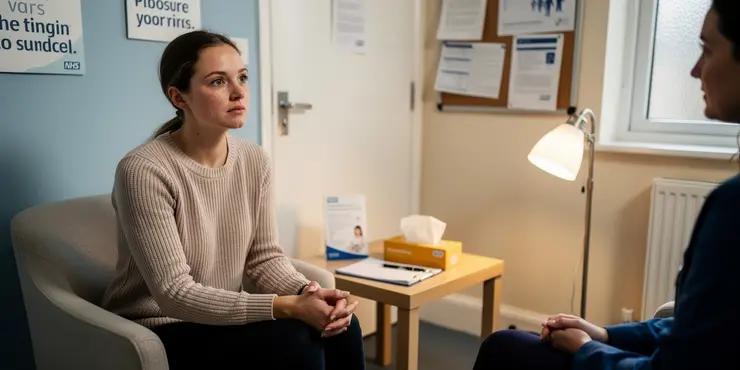
How do eating disorders affect mental health?
Relevance: 12%
-
Talking about self-harm | NHS
Relevance: 12%
-
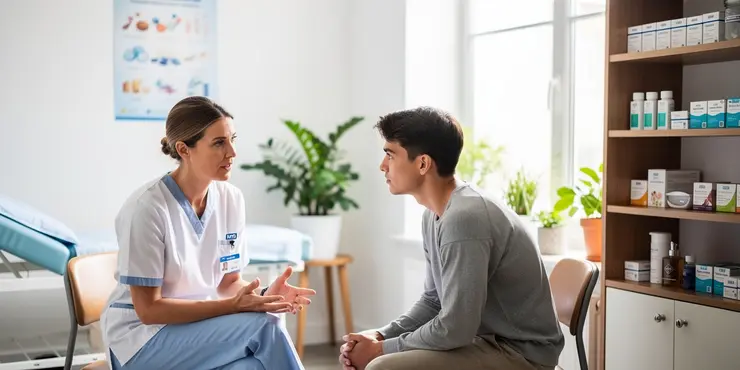
Can concussions lead to mental health issues?
Relevance: 12%
-
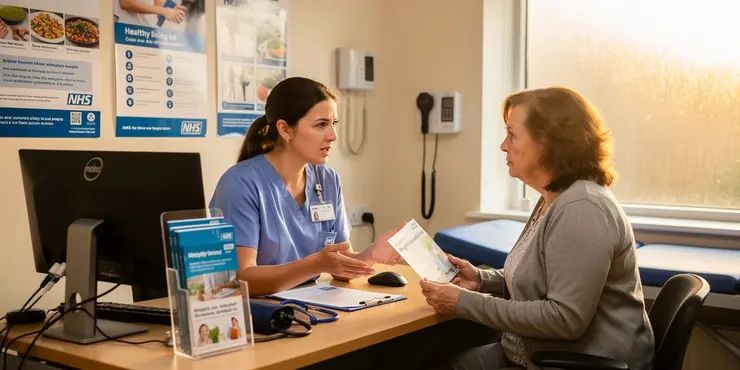
What are common side effects of weight loss drugs?
Relevance: 11%
-
How does binge drinking affect mental health?
Relevance: 11%
-
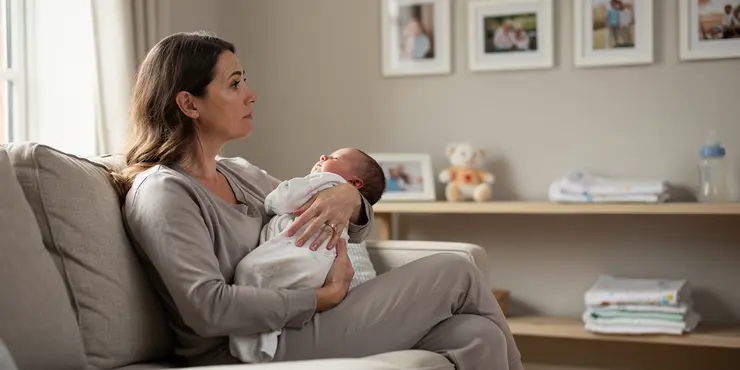
How do I know if I have postnatal depression? | NHS
Relevance: 11%
-
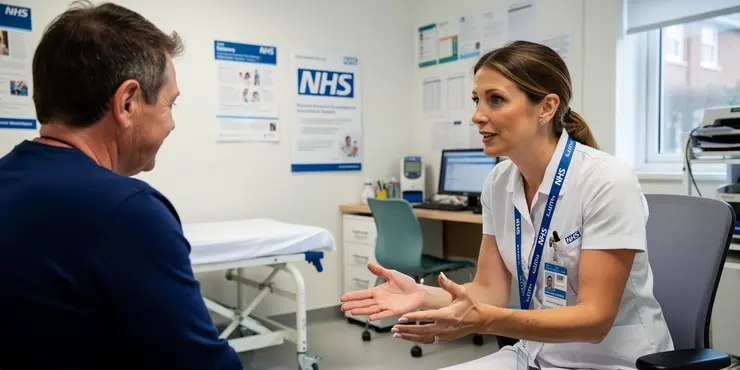
Treating anxiety and depression - www.slam.nhs.uk
Relevance: 10%
-
How does cognitive-behavioral therapy help with health-related anxiety?
Relevance: 10%
-
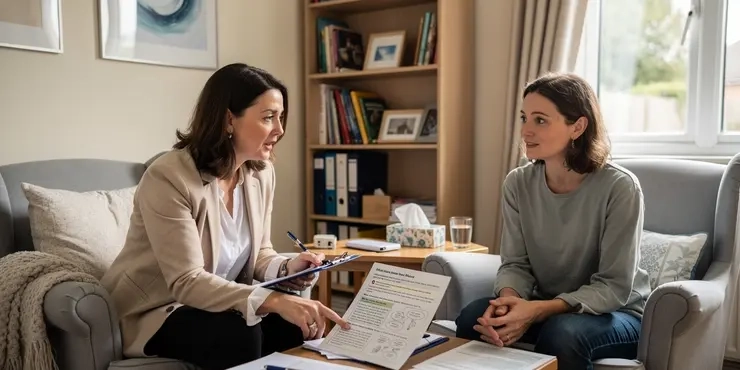
What is CBT
Relevance: 10%
-
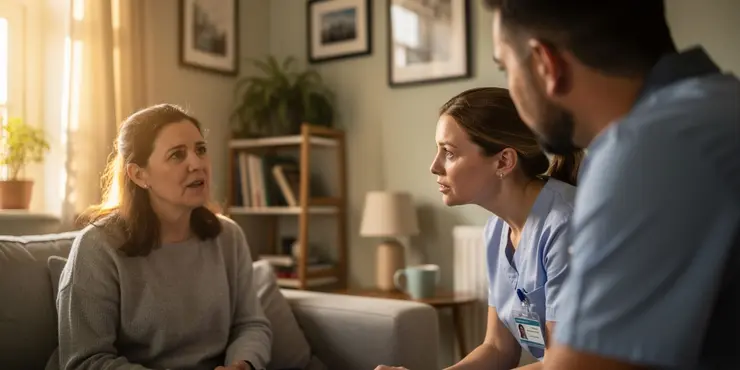
How is ketamine different from traditional antidepressants?
Relevance: 10%
-
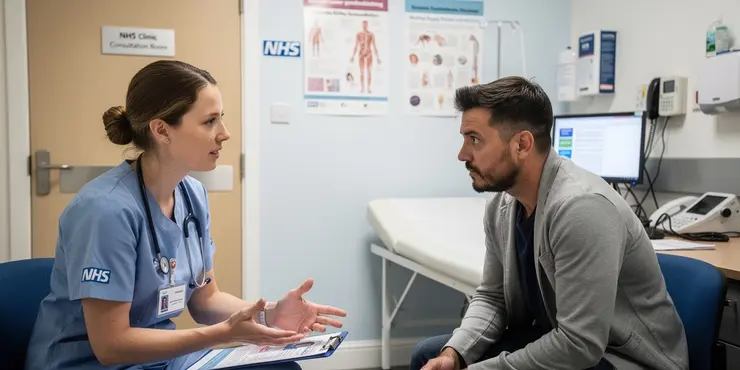
What are the medical uses of ketamine?
Relevance: 10%
-
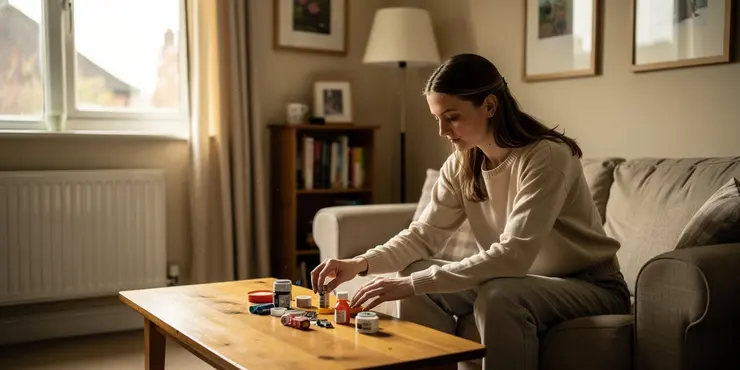
OCD
Relevance: 10%
-
Are there self-help strategies for managing health-related anxiety?
Relevance: 10%
-

BSL - Diagnosis of obsessive compulsive disorder (OCD)
Relevance: 10%
-

BSL - Introduction to obsessive compulsive disorder (OCD)
Relevance: 9%
-
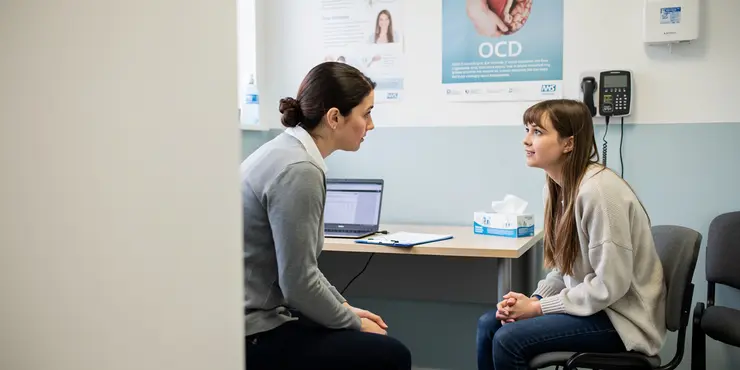
Clara Strauss: What is Obsessive Compulsive Disorder OCD
Relevance: 9%
-
What should someone do if they suspect they have health-related anxiety?
Relevance: 9%
-
Is it possible to fully recover from health-related anxiety?
Relevance: 9%
-
Can lifestyle changes help with health-related anxiety?
Relevance: 9%
-
What is the role of therapy in treating eating disorders?
Relevance: 8%
-

How do I talk to my partner about how I’m feeling?
Relevance: 8%
-

Should You Get Life Insurance UK | Life Insurance & Life Assurance
Relevance: 8%
-
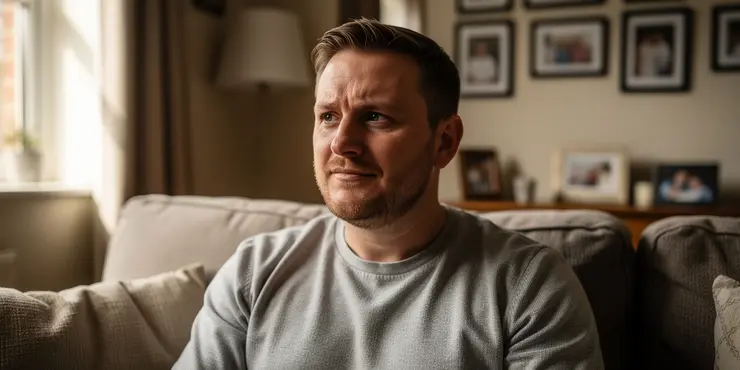
Clinical depression: Lawrence's story | NHS
Relevance: 8%
-
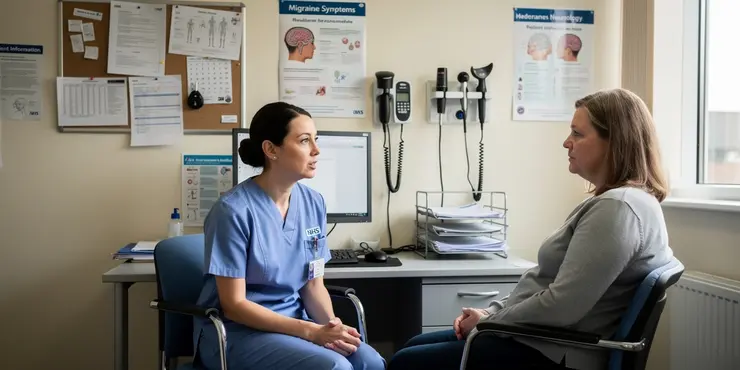
What are migraines and cluster headaches?
Relevance: 7%
Understanding Suicidal Thoughts - Kirsty's Experience
The Reality of Suicidal Thoughts
Suicidal thoughts can affect anyone at any stage of life. They are often driven by deep feelings of hopelessness, helplessness, and despair. These distressing thoughts are not uncommon in the United Kingdom, where an increasing number of people, particularly young individuals, report experiencing them. It is crucial to understand that having suicidal thoughts does not indicate a character flaw or a moral weakness. Instead, it is a serious symptom of mental health conditions that require support and understanding.Kirsty's Story
Kirsty, a young woman from London, is a poignant example of someone who struggled with suicidal thoughts and found hope through support and treatment. At 25, Kirsty felt overwhelmed by a series of personal setbacks, including the loss of a loved one and job instability. These events led her to experience depressive episodes, during which she felt trapped and unable to see a way out. Kirsty’s journey highlights the importance of reaching out and seeking help when grappling with such thoughts.Support Systems in the UK
The United Kingdom offers a variety of resources to help individuals like Kirsty. Various helplines, such as Samaritans (116 123) and Mind (0300 123 3393), provide immediate support to those in crisis. Additionally, seeking professional help from a GP can lead to referrals for specialized mental health services. Numerous community initiatives and support groups are also available, offering a network of care and empathy.The Importance of Reaching Out
Kirsty's recovery was greatly aided by her decision to reach out to friends, family, and mental health professionals. Communication is a vital step in addressing suicidal thoughts. For individuals facing similar challenges, sharing feelings with trusted people can provide relief and open avenues for receiving necessary help. Encouraging an atmosphere of open dialogue about mental health in the UK is essential for reducing the stigma and ensuring that those in need feel empowered to seek assistance.Hope and Recovery
Although the journey through suicidal thoughts can be arduous, Kirsty's story demonstrates that recovery is possible. With the right support, therapy, and sometimes medication, individuals can find renewed purpose and strength. Each step towards recovery is significant and should be celebrated. Understanding that you are not alone and that help is available can make all the difference in navigating through these dark periods. In conclusion, Kirsty's experience sheds light on the complexities of suicidal thoughts and the importance of comprehensive support systems in the UK. If you or someone you know is struggling, remember that help is available, and reaching out can be the first step towards recovery and hope.Understanding Thoughts of Suicide - Kirsty's Story
About Suicidal Thoughts
Anyone can have thoughts about suicide, no matter their age or life situation. These thoughts often happen when someone feels very sad and hopeless. Lots of people in the UK have these thoughts, especially young people. It's important to know that having suicidal thoughts doesn’t mean you are weak or bad. It means you need help for your mental health.Kirsty's Story
Kirsty is a young woman from London. She had thoughts of suicide but found hope with help and treatment. When Kirsty was 25, she faced many personal problems. She lost someone she loved and had trouble at work. These problems made her feel very sad and stuck. Kirsty’s story shows how important it is to ask for help if you feel this way.Help in the UK
There are many ways to get help in the UK. You can call helplines like Samaritans at 116 123 or Mind at 0300 123 3393. These services support people in crisis. You can also talk to your doctor, who can help you find mental health services. There are community groups and support groups that can help too.Why Talking is Important
Kirsty got better by talking to her friends, family, and mental health workers. Talking about your feelings is important. It helps to share your feelings with people you trust. This can make you feel better and help you get the help you need. In the UK, talking about mental health openly is important to reduce shame. It helps people feel strong enough to ask for help.Finding Hope and Getting Better
Getting through thoughts of suicide can be hard, but Kirsty's story shows that getting better is possible. With the right help, like therapy and sometimes medicine, people can feel better and find new hope. Every step you take to feel better is important and should be celebrated. Knowing you're not alone and that help is there can really help in tough times. In conclusion, Kirsty’s story helps us understand that thoughts of suicide are complicated but getting help can make a big difference. If you or someone you know is having a hard time, remember that help is available, and asking for it can be the first step to feeling hopeful again.Frequently Asked Questions
What are the common signs of suicidal thoughts?
Common signs include feelings of hopelessness, withdrawing from social activities, mood swings, talking about death or suicide, and increased use of alcohol or drugs.
Who can I talk to if I have suicidal thoughts?
You can talk to a trusted friend, family member, or a mental health professional. Helplines like Samaritans (116 123) are also available for free, confidential support.
What immediate steps can I take if I'm feeling suicidal?
Reach out to someone you trust, avoid being alone, remove any means of self-harm from your environment, and contact a crisis helpline or emergency services.
Are there support groups available for people with suicidal thoughts in the UK?
Yes, there are several support groups such as Samaritans, Mind, and Rethink Mental Illness that offer support to those experiencing suicidal thoughts.
How can therapy help with suicidal thoughts?
Therapy can help you understand the underlying causes of your suicidal thoughts, develop coping strategies, and provide emotional support during difficult times.
Can medication help with suicidal thoughts?
Yes, certain medications, especially antidepressants, can help alleviate the underlying mental health conditions that contribute to suicidal thoughts.
How can I support a friend or family member who is having suicidal thoughts?
Listen without judgment, encourage them to seek professional help, stay connected, and ensure they have no access to means of self-harm.
Is there a risk assessment tool for suicidal thoughts?
Healthcare professionals often use risk assessment tools to evaluate the severity of suicidal thoughts and the risk of suicide.
What are the long-term solutions for managing suicidal thoughts?
Long-term solutions include ongoing therapy, medication management, building a strong support network, and developing healthy coping mechanisms.
Are there any online resources for dealing with suicidal thoughts?
Yes, websites such as Mind and Samaritans provide a range of resources, from information and advice to online communities and crisis services.
How do I approach someone who seems to be having suicidal thoughts?
Approach them with care and concern, ask open-ended questions, listen actively, and encourage them to seek professional help.
What should I do if someone I know is in immediate danger due to suicidal thoughts?
If they are in immediate danger, you should not leave them alone and contact emergency services right away.
How does the NHS provide support for suicidal thoughts?
The NHS offers services such as GP consultations, mental health crisis teams, and referrals to therapy and psychiatric services.
Can lifestyle changes impact suicidal thoughts?
Yes, regular exercise, a balanced diet, improved sleep, and reducing alcohol and drug intake can have a positive impact on mental health and reduce suicidal thoughts.
How can I prevent a relapse into suicidal thoughts?
Continuing with therapy, taking prescribed medications, maintaining a support network, and using coping strategies can help prevent a relapse into suicidal thoughts.
What are the common signs of thinking about suicide?
It is important to know when someone might be thinking about hurting themselves. Here are some common signs to look for:
- Talking about wanting to die or hurt themselves.
- Feeling very sad or hopeless for a long time.
- Talking about being a burden to others.
- Withdrawing from friends and family.
- Giving away their things or saying goodbye.
- Having big mood swings.
- Doing things that could be dangerous.
If you see these signs in someone, it is important to talk to them and get help from a trusted adult or professional. Using pictures or simple stories can help explain these signs to someone who might find it hard to understand.
Here are some signs to look for:
- Feeling very sad.
- Not wanting to be with friends.
- Having big changes in mood.
- Talking about dying or hurting oneself.
- Using more alcohol or drugs.
If you notice these signs, tell an adult you trust. Drawing pictures, writing in a diary, or talking to someone can help you feel better.
Who can I talk to if I feel like hurting myself?
If you feel like hurting yourself, it is important to talk to someone. Here are some people who can help:
- A trusted adult, like a parent or teacher.
- A doctor or nurse.
- A counselor or therapist.
- A helpline, where you can talk to someone who understands.
Remember, you are not alone. There are people who care and want to help you feel better.
You can talk to someone you trust, like a good friend, a family member, or a mental health expert. You can also call helplines like Samaritans at 116 123. They are free and will listen to you without telling anyone.
What can I do right away if I feel like hurting myself?
If you are feeling like you want to hurt yourself, it is important to get help right away. Here are some simple steps you can take:
1. **Talk to someone:** Call a friend or family member and let them know how you are feeling. You can also call a helpline to talk to someone who can help.
2. **Stay with others:** Try to be around people you trust. Do not be alone if you are feeling very upset.
3. **Write it down:** Sometimes writing down your feelings can help. Use a notebook to write about how you feel.
4. **Breathe deeply:** Take slow, deep breaths to help calm yourself. Breathe in through your nose and out through your mouth.
5. **Use support tools:** Find apps or websites that help with stress and feelings. Some apps can teach you to calm down or relax.
Remember, you are not alone, and there are people ready to help you. Please reach out to them.
Talk to someone you trust, stay with other people, put away anything that could hurt you, and call a crisis helpline or emergency services for help.
Is there help for people in the UK who feel like hurting themselves?
Yes, there are groups that can help if you feel like hurting yourself. Talking to people who listen and care can really help. You can call special phone numbers or go to meetings. These people understand and want to help you feel better. If you are feeling very sad or scared, reach out for help. You are not alone.
There are groups that can help if you are feeling very sad or thinking about hurting yourself. Some of these groups are called Samaritans, Mind, and Rethink Mental Illness.
How can talking to a therapist help if you feel like hurting yourself?
If you feel really sad and think about hurting yourself, it’s important to talk to someone who can help. A therapist is like a helper who listens to you. Talking with a therapist can: - **Help you feel better:** They listen and understand how you feel. - **Give you ways to feel safe:** They help you learn what to do when you feel really upset. - **Make a plan to keep you safe:** Together, you can make a plan for what to do if you start feeling bad. You can also use some tools to help you, like: - **Call a helpline:** They are good people who want to help you right away. - **Talk to a grown-up you trust:** Like a parent, teacher, or friend. Remember, asking for help is a brave step, and there are people who care about you and want to help you feel better.Therapy is talking to someone who can help you when you feel very sad or want to hurt yourself. They can help you figure out why you feel this way, teach you ways to feel better, and support you when things are tough.
Can medicine help if you have thoughts about hurting yourself?
If you are thinking about hurting yourself, doctors can give you medicine. This medicine can help you feel better. It is important to talk to a doctor or a trusted adult about how you feel.
Here are some things that can help:
- Talk to someone you trust. This could be a family member, a teacher, or a friend.
- Call a helpline. There are people who can talk to you any time of day.
- Write down your feelings in a journal.
- Try doing something you enjoy, like drawing or listening to music.
Remember, you are not alone, and there are people who care about you and want to help.
Yes, some medicines can help. These are special medicines for depression. They can make you feel better and stop thoughts about wanting to hurt yourself.
How can I help a friend or family member who is thinking of hurting themselves?
Listen carefully and don't judge. Tell them it is okay to ask for help from a doctor or counselor. Stay in touch with them. Make sure they don’t have anything around that could hurt them.
Is there a tool to help understand if someone might hurt themselves?
Some tools can help. These tools ask simple questions to see if a person is feeling very sad or thinking about hurting themselves.
Tips for Support:
- Ask a trusted adult if you feel worried.
- Use pictures or charts to talk about feelings.
Doctors and nurses use special tools to check how serious someone's thoughts about suicide are. They want to see how big the risk is that the person might try to hurt themselves.
How can we help someone with big sad thoughts for a long time?
To feel better for a long time, you can try a few things. You can talk to a therapist, take medicine if the doctor says it's okay, build friendships with nice people, and learn ways to feel calm and happy.
Where can I find help online if I feel very upset or want to hurt myself?
Yes, websites like Mind and Samaritans have lots of helpful things. They give information, advice, and have online groups where you can talk to others. They also help when you are in a crisis.
How can I talk to someone who seems very sad and might want to hurt themselves?
If you see someone who is very sad, talk to them. Use kind words and show you care. You can say, "How are you feeling?" or "I'm here for you." Let them know they are not alone.
Listen carefully to what they say. Be patient and do not rush them. Keep your words simple. You can say, "I want to help you." or "You are important to me."
Tell a trusted adult or call a help line. Adults like teachers, parents, or counselors can help a lot. You can also share numbers like 1-800-273-8255. This is a phone number where nice people can talk and help.
Remember, it's not your fault. You are doing a good job by caring and helping.
Talk to them kindly and show you care. Ask questions that need more than a yes or no answer. Listen carefully when they speak. Support them to talk to someone who can help, like a doctor or a counselor.
What to Do if Someone You Know is in Danger Because of Suicidal Thoughts
If you think someone is in danger because they are talking about hurting themselves, here is what you can do:
- Call for help right away. You can call emergency services (like 911) for quick help.
- Stay with the person until help arrives, if it is safe to do so.
- Talk to them calmly. Let them know you care about them and want to help.
- Encourage them to talk to a trusted adult or a mental health professional.
Here are some tools that can help:
- Share a hotline number with them. They can talk to someone trained to help.
- Look for apps or websites that offer support for feelings of sadness or stress.
Remember, you are not alone, and there are people who can help.
If they are in danger right now, stay with them. Call emergency services straight away to get help.
How does the NHS help if you feel very sad or want to hurt yourself?
The NHS can help you in lots of ways if you feel very sad or want to hurt yourself.
You can talk to a doctor or nurse. They can listen to you and help you feel better.
There are special phone numbers you can call. People will listen to you and help.
You can also visit a center where people will help you feel safe and less sad.
If you go to a hospital, there are kind people who care and will help you quickly.
Tell someone you trust how you feel. They can help you talk to the NHS.
The NHS can help you see a doctor. They help if you are feeling very sad or upset. You can talk to someone on their team for mental health. They can also help you see a therapist or another health specialist.
Ask someone you trust to help you when you need it. You can also use a phone or computer to learn more and find help quickly. Remember, it is okay to ask for help.
Can changes in how you live help stop feeling very sad or wanting to hurt yourself?
Yes, doing exercise often, eating healthy food, sleeping well, and drinking less alcohol or using fewer drugs can help you feel better and think more happy thoughts.
How can I stop having bad thoughts again?
Here are some tips to help you feel better:
- Talk to someone you trust about how you feel. This could be a friend, family member, or a counselor.
- Try to do things you enjoy and that make you happy.
- Keep a list of positive thoughts or happy memories to read when you feel sad.
- Take deep breaths and try to relax if you start to feel upset.
- Stay connected with people who care about you.
- If you feel really bad, call a helpline for immediate help.
Remember, it's okay to ask for help and talk about your feelings.
Keep going to therapy, take your medicine, stay close to friends and family, and use ways to feel better. This can help stop sad thoughts from coming back.
Useful Links
This website offers general information and is not a substitute for professional advice.
Always seek guidance from qualified professionals.
If you have any medical concerns or need urgent help, contact a healthcare professional or emergency services immediately.
Some of this content was generated with AI assistance. We’ve done our best to keep it accurate, helpful, and human-friendly.
- Ergsy carfully checks the information in the videos we provide here.
- Videos shown by Youtube after a video has completed, have NOT been reviewed by ERGSY.
- To view, click the arrow in centre of video.
- Most of the videos you find here will have subtitles and/or closed captions available.
- You may need to turn these on, and choose your preferred language.
- Go to the video you'd like to watch.
- If closed captions (CC) are available, settings will be visible on the bottom right of the video player.
- To turn on Captions, click settings .
- To turn off Captions, click settings again.
More Items From Ergsy search
-

Suicidal Thoughts - Kirsty
Relevance: 100%
-

Linda | Surviving Suicidal Thoughts
Relevance: 94%
-

Kirsty | Surviving Suicidal Thoughts
Relevance: 94%
-

SLaM's Suicide Prevention, Learning and Support Strategy
Relevance: 51%
-

Suicide and Self Harm Prevention Strategy 2023-28
Relevance: 46%
-

Dr Hilary Jones shares his professional and personal thoughts on Colten Care
Relevance: 23%
-

What are the symptoms of postnatal depression?
Relevance: 22%
-

What conditions is ketamine used to treat?
Relevance: 17%
-

Small Talk Saves Lives
Relevance: 17%
-

What are the symptoms of SAD?
Relevance: 17%
-

What are the less common but serious side effects of weight loss drugs?
Relevance: 16%
-

Self Harm
Relevance: 15%
-
What is body dysmorphia and how is it related to eating disorders?
Relevance: 15%
-
What are the long-term effects of untreated eating disorders?
Relevance: 14%
-

Are there any contraindications for using Wegovy?
Relevance: 13%
-

How does the loneliness epidemic impact mental health?
Relevance: 13%
-

How do eating disorders affect mental health?
Relevance: 12%
-
Talking about self-harm | NHS
Relevance: 12%
-

Can concussions lead to mental health issues?
Relevance: 12%
-

What are common side effects of weight loss drugs?
Relevance: 11%
-
How does binge drinking affect mental health?
Relevance: 11%
-

How do I know if I have postnatal depression? | NHS
Relevance: 11%
-

Treating anxiety and depression - www.slam.nhs.uk
Relevance: 10%
-
How does cognitive-behavioral therapy help with health-related anxiety?
Relevance: 10%
-

What is CBT
Relevance: 10%
-

How is ketamine different from traditional antidepressants?
Relevance: 10%
-

What are the medical uses of ketamine?
Relevance: 10%
-

OCD
Relevance: 10%
-
Are there self-help strategies for managing health-related anxiety?
Relevance: 10%
-

BSL - Diagnosis of obsessive compulsive disorder (OCD)
Relevance: 10%
-

BSL - Introduction to obsessive compulsive disorder (OCD)
Relevance: 9%
-

Clara Strauss: What is Obsessive Compulsive Disorder OCD
Relevance: 9%
-
What should someone do if they suspect they have health-related anxiety?
Relevance: 9%
-
Is it possible to fully recover from health-related anxiety?
Relevance: 9%
-
Can lifestyle changes help with health-related anxiety?
Relevance: 9%
-
What is the role of therapy in treating eating disorders?
Relevance: 8%
-

How do I talk to my partner about how I’m feeling?
Relevance: 8%
-

Should You Get Life Insurance UK | Life Insurance & Life Assurance
Relevance: 8%
-

Clinical depression: Lawrence's story | NHS
Relevance: 8%
-

What are migraines and cluster headaches?
Relevance: 7%


